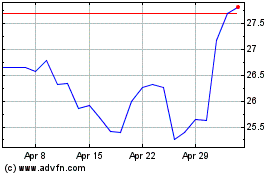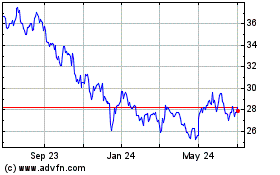By Stephanie Armour
WASHINGTON -- The Trump administration is asking states to speed
up approval for vaccine distribution sites by Nov. 1, the latest
sign the federal government is eager to get a vaccine out before
the end of the year.
Centers for Disease Control and Prevention Director Robert
Redfield urged state governors to remove barriers to building
permits for distribution sites for use by McKesson Corp. and the
drug wholesaler's subsidiaries, according to an Aug. 27 letter. The
Dallas-based company has a deal with the federal government to
distribute a coronavirus vaccine when it becomes available.
"CDC urgently requests your assistance in expediting
applications for these distribution facilities, and, if necessary,
asks that you consider waiving requirements that would prevent
these facilities from becoming fully operational by Nov. 1, 2020,"
read the letter from Dr. Redfield to the states.
The administration has been pushing for a coronavirus vaccine.
Food and Drug Administration Commissioner Stephen Hahn said in a
recent interview with the Financial Times that an emergency
authorization for a vaccine could be appropriate even before the
vaccine has completed Phase 3 clinical trials.
An FDA vaccine advisory committee will meet Oct. 22 to discuss
the development, authorization and licensing of vaccines to prevent
Covid-19.
The CDC also provided documents to states outlining some of the
most detailed descriptions to date of a vaccine rollout plan.
The agency said vaccines would either be approved as licensed
vaccines or under emergency-use authorization and would likely need
to be administered twice.
"Vaccine and ancillary supplies will be procured and distributed
by the federal government at no cost to enrolled Covid-19
vaccination providers, " the documents state.
They also state that jurisdictions must be prepared to
immediately vaccinate identified critical populations when the
earliest Covid-19 vaccine doses are available.
A screening tool on the CDC website will help individuals
determine their eligibility for a vaccine and direct them to a
vaccine finder.
One scenario described the availability of about two million
doses by the end of October and another 10 million to 20 million
doses available by the end of November, according to the documents
sent to states.
The Trump administration has prioritized a vaccine through an
initiative it has dubbed Operation Warp Speed, and the Department
of Health and Human Services has said it is preparing to launch a
November public-awareness campaign across TV, radio and social
media, focusing on vaccine safety, efficacy and patient
hesitancy.
Dr. Hahn's comments and the push to set up distribution sites by
Nov. 1 has concerned some public-health experts who worry a vaccine
could be rushed because of political pressure before it is
determined to be fully safe. Election Day is Nov. 3, though many
voters will have cast their ballots by mail well before that
date.
"From this report, expect a photo-op of vaccines being delivered
November 1," Andy Slavitt, former acting administrator of the
Centers for Medicare and Medicaid Services, tweeted Wednesday in
reference to the CDC letter to states.
Trump administration officials have pushed back on the
criticism, saying Americans can trust the vaccine process.
"We all recognize that the public will have confidence in our
decisions only if they are supported by the science. My personal
commitment is to assure that all decisions meet FDA's standard. The
patient and the public always come first," Dr. Hahn tweeted
Wednesday.
The administration on Wednesday ramped up its messaging on the
safety of a vaccine. HHS Secretary Alex Azar and Dr. Moncef Slaoui,
chief adviser to Operation Warp Speed, issued a release saying the
optimistic target for a safe and effective vaccine is no later than
January 2021.
"While one can never guarantee success in any scientific
endeavor, it is now becoming increasingly likely we will deliver
this historic victory for the American people and the world," they
said in the release.
The administration this week said it won't join an international
vaccine effort because it is co-led by the World Health
Organization. President Trump has criticized WHO, saying it is too
beholden to China.
Some public-health leaders have said the decision could mean the
U.S. would have trouble getting vaccine doses if another country
develops a successful vaccine more quickly. It also puts more
pressure on the U.S. to develop a vaccine.
McKesson, one of the world's largest drug wholesalers, said last
month that it would be a centralized distributor of future Covid-19
vaccines and the supplies needed to administer vaccinations.
"Vaccines and related supplies will be delivered to
point-of-care sites across the country at the U.S. government's
direction," the company said in an Aug. 14 press release.
National distribution plans call for prioritizing front-line
health workers and people especially vulnerable to more severe
symptoms of Covid-19.
Three vaccines are in Phase 3 clinical trials in the U.S. They
are an AstraZeneca PLC vaccine developed with Oxford University,
one from Moderna Inc., and a candidate from Pfizer Inc. and
German-based BioNTech SE.
Pfizer said on Thursday that it expects to have results from its
vaccine study by the end of October.
AstraZeneca and Oxford University are conducting a Phase 3 study
of their vaccine candidate in the U.K., South Africa and Brazil
with several thousand volunteers. The company expects to have
results from the study between October and the end of 2020,
depending on infection rates in the countries where the trial is
being conducted, an AstraZeneca spokesman told The Wall Street
Journal on Thursday. The company had previously said it expected
results between September and November.
In a July conference call with reporters, AstraZeneca executives
said on the call that data from the study could be sufficient to
gain emergency-use authorization in the U.S., if the data are
strong enough.
"We will be ready from a manufacturing viewpoint to start
delivery," AstraZeneca Chief Executive Pascal Soriot said on the
conference call. "The question is how quickly do we get a clinical
readout and that's very much influenced by the infection rates in
the community."
AstraZeneca said this week that it had launched a second Phase 3
vaccine study in the U.S. that aims to enroll 30,000 volunteers.
"We are moving quickly but without cutting corners, and regulators
have clear and stringent efficacy and safety standards for the
approval of any new medicine, and that includes this potential
Covid-19 vaccine," Mr. Soriot said in a statement Monday.
The AstraZeneca spokesman declined to comment on the CDC's Aug.
27 letter.
Thirty-five percent of Americans said they wouldn't get a free
FDA-approved vaccine if it were ready, according to a poll released
Aug. 7 by Gallup. Four in 10 nonwhite Americans and nearly half of
Republicans said they wouldn't get vaccinated, while Democrats were
more likely to say they would.
--Jared Hopkins and Joseph Walker contributed to this
article.
Write to Stephanie Armour at stephanie.armour@wsj.com
(END) Dow Jones Newswires
September 03, 2020 13:42 ET (17:42 GMT)
Copyright (c) 2020 Dow Jones & Company, Inc.
Pfizer (NYSE:PFE)
Historical Stock Chart
From Mar 2024 to Apr 2024

Pfizer (NYSE:PFE)
Historical Stock Chart
From Apr 2023 to Apr 2024
